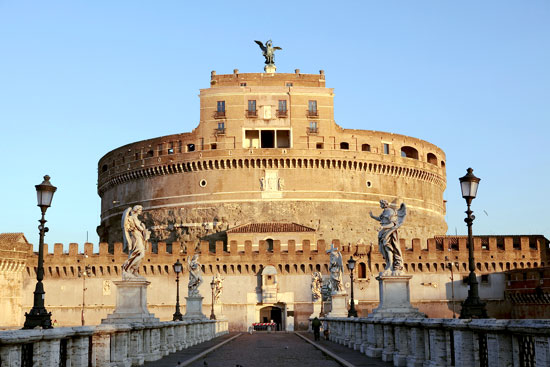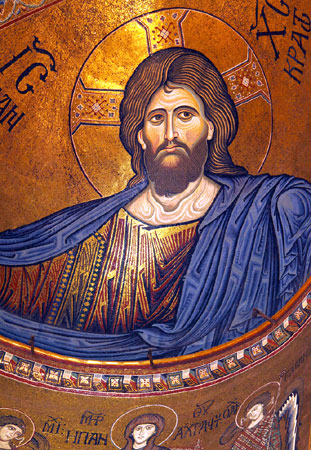Religion: Religion Overview
Religions of the Country
Roman Catholicism is the predominant religion of Italy, representing most of the population. Islam is the second largest religion, with about one million adherents who are mostly Sunnis. Other Christian denominations include Jehovah's Witnesses, Assembly of God, Methodists and Waldesians, and Mormons.
Hinduism has many adherents, as does Buddhism, mostly in the South Asian community. Jews worship at synagogues in 21 cities, and there are also a small number of Bahai’s and other Protestant groups.
The independent enclave of the Vatican in Rome, presided over by the Pope, is the capital of the worldwide Roman Catholic Church. Italy, and especially Rome, is home to some of the most magnificent and revered churches, shrines, tombs, and relics of the martyrs in the whole of Christendom. The Vatican’s huge St. Peter’s Basilica is an architectural masterpiece that contains the Sistine Chapel frescoes created by Michelangelo and innumerable other priceless works of Renaissance art by Bernini, Rafael, and other masters.
Basic Tenets
The Catholic Church believes itself the legitimate successor to the ministry of Jesus Christ through uninterrupted apostolic succession from St. Peter to the present Pope. Like most other Christian faiths, Catholicism is both monotheistic and trinitarian, following one God in three forms, the Father, the Son, and the Holy Spirit. It holds that Jesus Christ, the Son, died and rose from the dead to redeem humanity from its sins. It considers both scripture as well as church teachings and sacraments to be legitimate sources of revelation and grace. The sacrament of the Eucharist, or Holy Communion, is usually celebrated at Mass; Catholics go through a period of study before they may receive communion for the first time, as they believe in the real presence of Christ in the bread and wine.
The Roman Catholic Church also propounds the doctrine of Papal infallibility, which means the Pope is prevented by the Holy Spirit from committing errors in matters of official Church dogma. The Catholic Church regards human life as sacrosanct and vehemently opposes activities like cloning, eugenics, euthanasia, and abortion.
Spiritually Devout or Nominal
Despite the omnipresence of the Vatican and the Catholic Church in Italian culture and public life, only about 20 percent of Italians regularly attend church services. However, Catholicism influences the lives of even those who are nominal Catholics.
Religious Conflict
Multiple religions have traditionally co-existed peacefully in Italy. The situation, however, has changed dramatically in recent years. Anti-Muslim sentiment has increased in Italian society, fueled by the immigration issue and the war in Iraq, where Italians have been taken hostage. However, violent clashes have not occurred between religious groups.
Secularism
The 1984 revision of the Concordat between the Italian government and the Catholic Church established secularism as a constitutional principle in Italy. The revised Concordat also extended state support of religion (previously enjoyed only by the Catholic Church) to recognized non-Catholic religious groups.
The strong secular movement in Italy primarily includes, leftist intellectuals. The far-right groups have vociferously objected to judicial rulings favoring secularism, like the removal of crosses from classrooms to avoid offending Muslim students. Many lawsuits have opposed the continued presence of Catholic symbols like crucifixes in courtrooms, schools, and other public buildings. In a case filed by an Islamic group, the court refused to order the removal of crucifixes from a polling station.
Superstitions
The remnants of pagan superstitions still persist in Italy, albeit below the surface, like belief in the evil eye, charms, spells, dream-messages, and many other sorts of omens.
According to myth, Rome was founded by twin-brothers Romulus and Remus, sons of Mars, the god of war. The twins were supposedly suckled and raised by a wolf. After the founding of Rome, Romulus killed his brother to obtain his power. Romulus was deified and worshipped as the god Quirinus. His festival was known as Quirinalia, which was celebrated on February 17.
Religious Clerics
The sovereign enclave of the Vatican in Rome is the capital of the world-wide Catholic Church. Its clerics, from the Supreme Pontiff to the cardinals, bishops, and priests, wield considerable influence over Italian society and government. The clergy conducts rituals attending the life cycles of Italians like baptism, weddings, and funerals. Despite the secular nature of modern Italian society, the clergy are at the forefront in debating various issues like abortion (legal in Italy) and stem cell research. Mainly due to their efforts, the Italian Senate passed a bill in 2003 (called "unacceptable and immoral" by leading Italian scientists) restricting the creation and use of human embryos for medical research.
Roman Catholic clerics receive their training in the various theological and ecclesiastical seminaries in Italy. For higher theological studies, the clerics go to institutions like the Pontifical Gregorian Institute in Rome, founded by St. Ignatius Loyola in 1551, or the Pontifical Oriental Institute, the primary center for the study of Eastern Christianity and famous for its collection of Old Slavonic manuscripts.
State Regulations
The Concordat generally governs the relationship between the Italian state and the Catholic Church and preserves the Church’s privileged position in Italy. The Church has the right to appoint Catholic teachers in public schools who are paid by the government. Otherwise, clergy are not regulated by the state.
Religion and Public Life
The Roman Catholic Church has great authority in Italian public life. The Church is very important to most Italians (even nominal Catholics) as the conductor of rituals connected to various rites of passage. The Church impacts public life through its innumerable educational and charitable institutions as well as by exclusively providing Catholic religious instruction in public schools. The Church has often led and influenced public discourse and debate on various issues like abortion and stem cell research. In a bellwether victory, the Church managed to influence the passing of a legislation severely restricting the creation and use of human embryos in medical research and treatment.
Rome and other parts of Italy are home to innumerable churches, shrines, and relics of the saints. Visiting such places and reciting novenas to the Virgin Mary, the Sacred Heart of Jesus, and various saints is a popular practice among devout Catholics.
Religious Holidays and Ceremonies
Only Christian holidays have the status of national holidays in Italy. They are Epiphany, Easter, Easter Monday, Assumption Day, All Saints’ Day, Immaculate Conception Day, Christmas, and St. Stephen’s Day. Besides this, offices and shops are closed in various cities on the feast days of their patron saints.
The important religious ceremonies in Italy are the celebration of the sacraments, especially, baptism, Eucharist, matrimony, and holy unction. The Eucharist, which is celebrated and worshipped during Mass, is the most important ceremony for Roman Catholics.
Government and Religion
The Italian government generally respects the freedom of religion provided in the Constitution. However, the Roman Catholic Church, due to historical reasons and its sovereign status in the Vatican, has certain privileges not enjoyed by other religious groups. In 1929, the Fascist government of Benito Mussolini entered into a Concordat with the Catholic Church recognizing it as the state religion and resolving all the disputes relating to the dissolution of the Papal States. The 1984 revision of the Concordat extended the state support of religion to non-Catholic denominations. In order to benefit from certain privileges, religious groups have to enter into an accord (intesa) with the government. The Waldesian Church obtained the first intesa in 1984, followed by Seventh-Day Adventists and Assembly of God (1988), Jews (1989), and Baptists and Lutherans (1995). Since 2000 the government has also started negotiations with Mormons, Eastern Orthodox, Apostolic Church, Hindus, and Soka Gakkai (Japanese Buddhists). However, Muslims are yet to receive an intesa, because of divisions among Muslim organizations.
The intesa, or special accord, grants religious clerics of all recognized religious groups certain privileges: routine access to state hospitals, prisons, and military barracks; civil registry of religious marriages; permission for particular religious practices at funerals; exemption for students from school attendance on their religious holidays; and state routing of funds to a particular religious community through a voluntary check-off on taxpayer returns.
Although the Roman Catholic Church has the status of a state religion, there is a de facto separation of Church and state in Italian polity, and the country’s civil laws are not a reflection of Catholicism.
Persecution
The Italian government does not persecute outside religions. Since the launch of the war on terror, however, the government has drawn criticism from Islamic groups for its vigorous attempts to clamp down on illegal immigration and radical Islamic indoctrination of Italy’s Muslim youth. Government officials in Northern Italy have invoked a rarely used 1931 law against hiding one’s identity, in order to prohibit Muslim women from wearing burkas or chadors (Muslim robes covering the whole body).
Proselytizing is legal in Italy and foreign missionaries and Evangelical groups can freely operate in the country. However, the government is trying to restrict the proselytizing activities of radical Islamic clerics and the spread of radical Islamic theology. Anyone is free to possess and display religious literature and articles in Italy.
Religious Tolerance
Italy and the Roman Catholic Church have a long history of anti-Semitism, but the present-day Catholic Church has tried to make amends to the Jewish community. The government of Silvio Berlusconi created the Inter-Ministerial Commission to Combat Anti-Semitism in 2004 to combat the anti-Semitic actions of the police and local/federal officials. The Catholic Church has been wary of the influence of Islam and its radical clerics in Italy, as evidenced by Pope Benedict XVI’s inadvertent references to "spreading Islam by the sword." Foreign missionaries (apart from the Islamic variety) and Evangelical groups are tolerated, if not welcomed, by local people, although they will be under the shadow of the powerful Roman Catholic Church. The same attitude can be expected towards proselytizing.
Protocols for Foreigners
Foreigners are free to participate in the religious activities of Italy. Women attending church should cover up with a scarf or sweater if they are wearing a low-cut or shoulder-exposing top. Men should remove their hats when entering a church.
Tourists visiting churches or cathedrals to see the art or architecture should check to see if any religious services are taking place in the main church or a side chapel, taking due care not to distract worshipers.
Copyright © 1993—2024 World Trade Press. All rights reserved.

 Italy
Italy 



